Have you seen the Instagram Reel that jokes that replacing your morning coffee with green tea can decrease what little joy you have left in this world by 80% or something along those lines? As a coffee lover and former green tea not-so-enthusiast, that one cracks me up every time. Seriously, I re-watch it over and over and every time I see a new variation. But enough about my social media habit. Instead, let me tell you why and how I’ve become a green tea lover without giving up my morning coffee.
For years now, every time I dig into the research on nutrition for heart health, longevity, brain health, cancer prevention, bone health, you name it, green tea comes up again and again. As a dietitian, I like to walk the walk, and sometimes that means teaching myself to like foods (or teas) that I recommend. This one took a little while to become a habit. I’ll admit that it still can’t match the appeal of my morning coffee, and it does make me nauseous if I have it on an empty stomach, but it is now part of my daily routine, and I actually find it quite pleasant.
What makes green tea so special?
Though it comes from the same plant as black tea, Camellia sinensis, the processing of the leaves is what makes green tea green. Tea leaves destined to become green tea are not allowed to dry out naturally by withering, so they do not ferment and oxidize like black tea. Instead, after picking they are pan-fired, oven-dried or steamed. As a result, green tea has a lighter, grassier taste than traditional black tea and contains significantly more of some specific types of catechin polyphenols. There are several green tea catechins, but the most abundant is epigallocatechin-3-gallate (EGCG) which has become the focus of many studies for its bioactive properties. Green tea’s calming L-theanine, detoxifying chlorophyll and energizing caffeine have been linked to potential benefits as well. For your reference, caffeine content of green tea ranges from 14 to 61 mg per 6 or 8 oz serving or an average of 28 mg caffeine per 8 oz serving compared to an average of about 96 mg caffeine in 8 oz of brewed coffee.
Why I learned to love green #tea and how you can too. #saslife Click To TweetHealth Benefits
There are tons of studies (ranging from cultured cell, animal and human studies to meta-analyses and systematic reviews) that explore the role of green tea and its components in preventing or reducing risk of health conditions. (You can find over 9,000 articles related to green tea and health in PubMed!) Although green tea should not replace evidence-based medical interventions for serious medical conditions, findings of these studies suggest that green tea is worth considering as part of a therapeutic nutritional approach to:
- Reducing triglycerides, total cholesterol and LDL cholesterol
- Reducing anxiety, improving memory and increasing attention
- Offering protection from neurodegenerative diseases such as Parkinson’s Disease
- Improving bone mineral density (Prefer black tea? It turns out black and rooibos teas may have a similar effect.)
- Potentially decreasing risk of developing cancer and managing existing cancer
- Increasing insulin sensitivity to improve blood sugar management/metabolism
- Improving fertility and potentially improving sperm count and viability
Keep in mind, some of the potential health effects above are just starting to be explored. The main message here is that the green tea catechins can potentially improve all aspects of health due to their anti-inflammatory, antioxidant and tumor-suppressing effects.
Choosing a Tea
Because tea plants are often heavily sprayed with pesticides, I always recommend choosing organic teas. For more on quality, check out A Closer Look at Chocolate, Coffee and Tea. Some good brands to try are Numi, Yogi, Traditional Medicinals, Choice Organic and Rishi, and my personal go-to for loose leaf tea is Mountain Rose Herbs. If you are looking for decaf, Allegra is a good option.
Matcha offers a twist on traditional green tea. It boasts a higher concentration of health-promoting components like EGCG and chlorophyll because of how it’s grown (spends more time in the shade) and how it’s consumed. The tea leaves are ground into a fine powder and dissolved into water (or added to smoothies, oats or other recipes). Because matcha is essentially a concentrated version of green tea any toxins found in the plant become more concentrated too. The Republic of Tea offers an organic version, and you can find a variety of super high-quality matcha here.
How much is enough?
There is no one-size-fits-all recommendation for how much green tea to consume for maximum benefits. Many studies have shown benefits with 2-3 cups per day, while other studies looked at a whopping 10 or more cups per day. The general recommendation is about 3 cups of green tea per day for heart health, which supplies a therapeutic dose of 240-320 mg of polyphenols (catechins). Cancer prevention studies are trickier with some claiming a decreased lung cancer risk with 2 cups, > 5 cups showing a possible association with breast cancer prevention, > 7 cups associated with decreased risk of prostate cancer, and some studies finding no association at all.
For me, more than 3 cups a day is hard to swallow, but I get a decent amount by brewing my green tea in a big ol’ mason jar and sipping throughout the morning after my cup of joe and breakfast. The folks in research labs might tell me that if I don’t polish it off within the hour, I’m going to lose a fraction of the EGCG, but I’m happy enough knowing that I’m getting some good health benefits from what I do consume.
Take-home message: any amount of green tea will supply you with a nice dose of antioxidant containing catechins, so even 1 cup can help to provide some balance to your body. If you are looking for a more therapeutic dose related to a health conditions, more may be better.
How to make it
Some experts say that in order to be considered a therapeutic dose, you need to brew over 1 tablespoon of tea leaves. Many standard tea bags contain 2 teaspoons, so if you are using them, double up with each cup you brew. If you are using loose leaf, aim for 2 tablespoons for even more benefits.
As for temperature, this is where you get to experiment. To extract and retain those health-boosting catechins, you should steep tea in not quite boiling water (75-80°C/167-176°F) for at least 4 minutes. The longer you steep your hot tea, the more caffeine and bitterness you’ll get. One study found that adding ice after 5 minutes resulted in more polyphenols than steeping for 4 minutes and leaving it hot, presumably because the ice protected the compounds from breaking down. Have plenty of time on your hands? The same study found that cold steeping for 12 hours resulted in significantly higher bioactive compound content than hot steeping.
If microwaving is your thing, go for it. Some studies suggest that adding a tea bag to water and microwaving can extract and retain more of some phytonutrients than conventional methods. This article suggests adding a teabag to water and microwaving at half power for 30 seconds, though I couldn’t find the study to back up that specific recommendation.
The point is, make your green tea and drink it in a way (without too much sweetener) that’s convenient and enjoyable for you.
Tropical Matcha Smoothie
Makes 1 serving
PRINT RECIPE
Ingredients
1 tsp matcha powder (I used Republic of Teas Organic Full-Leaf Matcha)
½ cup frozen mango chunks
2 handfuls of baby leafy greens
¾ cup milk of choice*, unsweetened (I used Elmhurst Walnut Milk)
1 scoop vanilla protein powder* or vanilla collagen
peptides* (I used Sunwarrior Protein Warrior Blend)
Shredded unsweetened coconut (optional garnish)
*Check the ingredient list if you have dietary restrictions or preferences
Directions
- Add all of the smoothie ingredients except coconut into a blender and purée until smooth.
- Serve the smoothie in a glass and top with shredded unsweetened coconut (optional).
Notes
- Looking for a fancy-looking matcha smoothie? Check out this Matcha Collagen Cloud Smoothie.
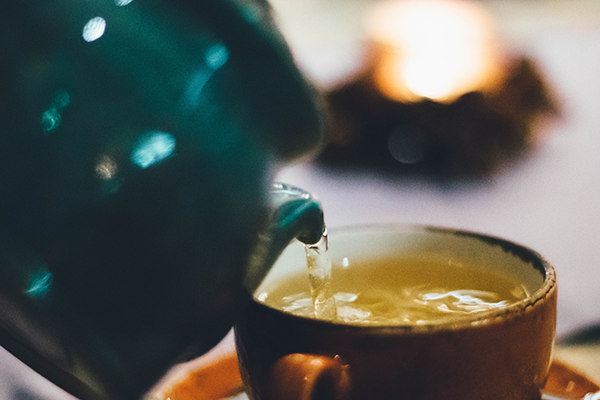

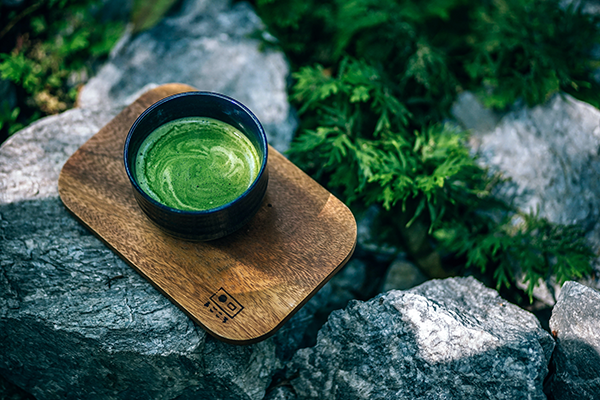
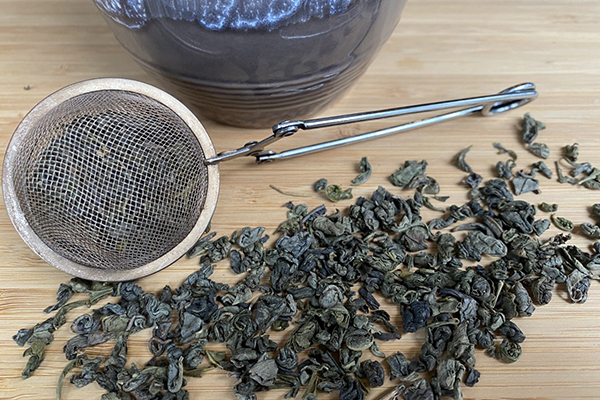
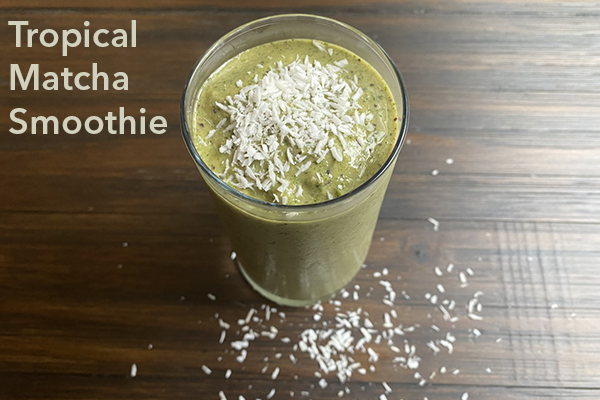
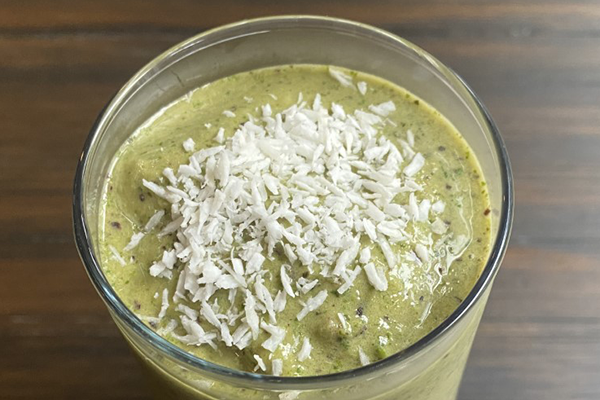

4 Comments
Jen, great article! Hot green tea is my drink of choice. Because I'm prone to kidney stones (well less prone and more of a stone-making machine), my doctor advised me to moderate my intake of "brown" beverages, those high in oxalates (e.g., coffee, black tea, colas). I drink green tea all day every day (without sweeteners). I must admit it was an acquired taste, but now it's my favorite. The other health benefits are a plus, too.
Thanks for this article! I also get nauseated when drinking green tea on an empty stomach. You gave some great tips on how to prepare it, and I love that I don't have to give up my beloved coffee 🙂
Are the flavored versions (e.g. green tea with Elderberry) just as good for you? Please don't say no, or that Instagram joke may be true.
Jorie, I suspect tea bags that have additional components (like elderberry, passionfruit, orange, etc.) have a tad less green tea, but overall you're still getting benefit, so I say go for it!